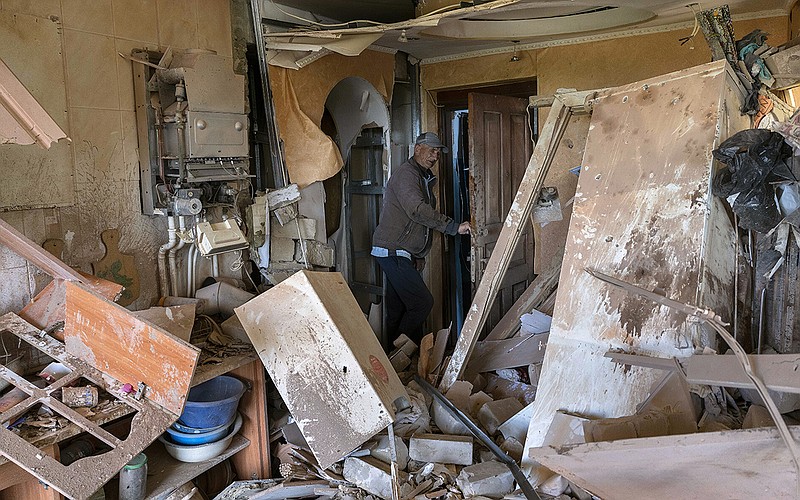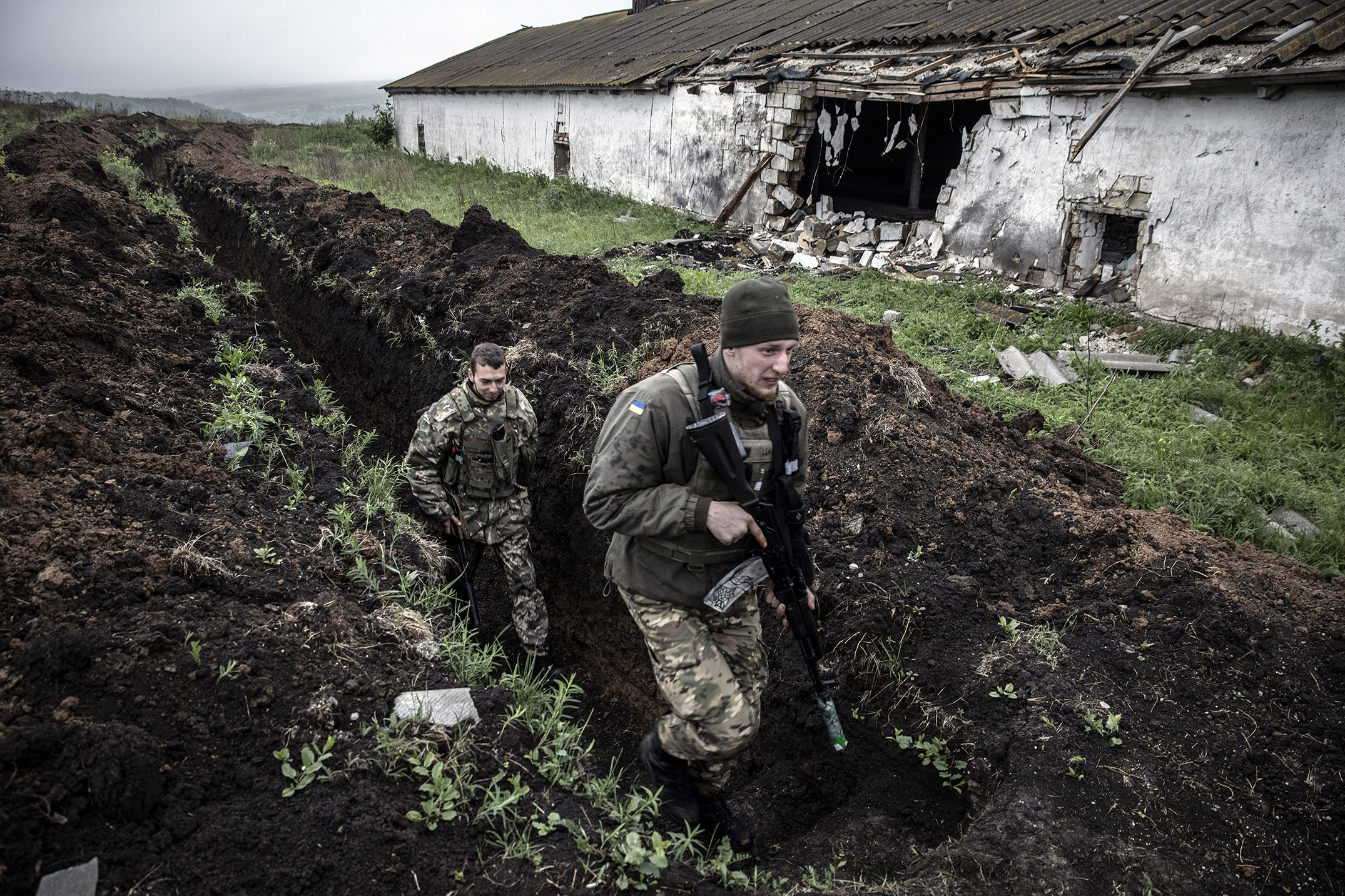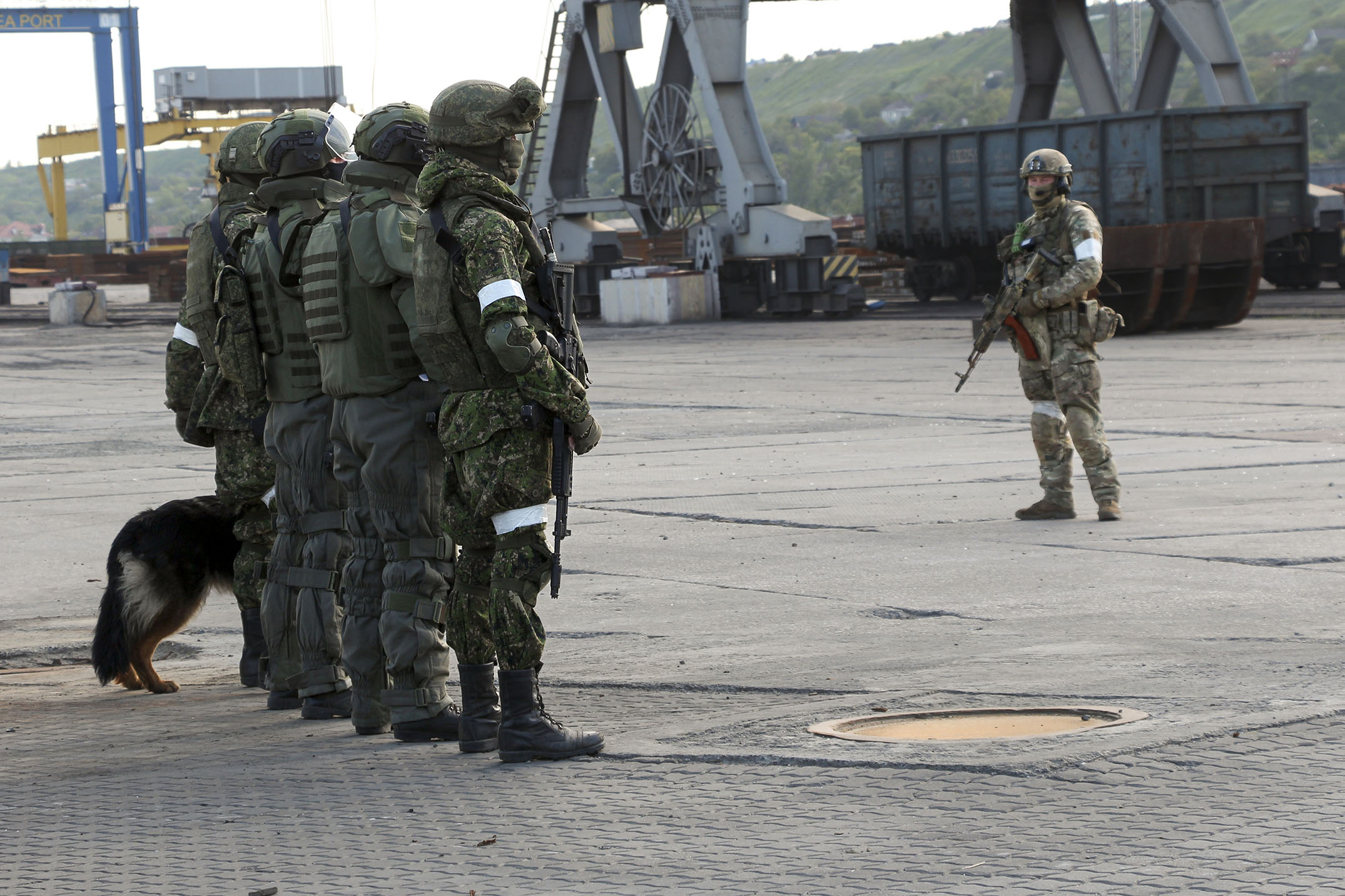KRAMATORSK, Ukraine — Moscow-backed separatists pounded eastern Ukraine’s industrial Donbas region Friday, claiming to capture a railway hub as concerns grew that besieged cities in the region would undergo the same horrors experienced by the people of the port city Mariupol in the weeks before it fell.
Ukrainian officials warned that their forces wouldn’t be able to stop the Russian offensive without more sophisticated Western-supplied weaponry.
The fighting Friday focused on two key cities: Sievierodonetsk and nearby Lysychansk. They are the last areas under Ukrainian control in Luhansk, one of two provinces that make up the Donbas and where Russia-backed separatists have already controlled some territory for eight years.
Authorities say 1,500 people in Sievierodonetsk have already died since the war’s start scarcely more than three months ago. Russia-backed rebels also said they’d taken the railway hub of Lyman.
The governor of Luhansk warned that Ukrainian soldiers may have to retreat from Sievierodonetsk to avoid being surrounded. But he predicted an ultimate Ukrainian victory.
“The Russians will not be able to capture Luhansk region in the coming days, as analysts predict,” Serhiy Haidai wrote Friday on Telegram. “We will have enough forces and means to defend ourselves.” Ukrainian President Volodymyr Zelenskyy also struck a defiant tone. In his nightly video address Friday, he said: “If the occupiers think that Lyman or Sievierodonetsk will be theirs, they are wrong. Donbas will be Ukrainian.” For now, Sievierodonetsk Mayor Oleksandr Striuk told The Associated Press that “the city is being systematically destroyed — 90% of the buildings in the city are damaged.” Striuk described conditions in Sievierodonetsk reminiscent of the battle for Mariupol, in the Donbas’ other province, Donetsk.
Now in ruins, the port city was constantly barraged by Russian forces in a nearly three-month siege that ended last week when Russia claimed its capture. More than 20,000 of its civilians are feared dead.
Before the war, Sievierodonetsk was home to around 100,000 people. About 12,000 to 13,000 remain in the city, Striuk said, huddled in shelters and largely cut off from the rest of Ukraine. At least 1,500 people have died there because of the war, now in its 93rd day.
The figure includes people killed by shelling or in fires caused by Russian missile strikes, as well as those who died from shrapnel wounds, untreated diseases, a lack of medicine or being trapped under rubble, the mayor said.
In the Sievierodonetsk’s northeastern quarter, Russian reconnaissance and sabotage groups tried to capture the Mir Hotel and the area around it, Striuk said.
STRATEGY HINTS
Hints of Russia’s strategy for the Donbas can be found in Mariupol, where Moscow is consolidating its control through measures including state-controlled broadcast programming and overhauled school curricula, according to an analysis from the Institute for the Study of War, a Washington think tank.
Gen. Phillip Breedlove, former head of U.S. European Command for NATO, said Friday during a panel led by the Washington-based Middle East Institute that Russia appears to have “once again adjusted its objectives, and fearfully now it seems that they are trying to consolidate and enforce the land that they have rather than focus on expanding it.” Ukrainian analysts said Russian forces have taken advantage of delays in Western arms shipments to step up their offensive there.
That aggressive push could backfire, however, by seriously depleting Russia’s arsenal. Echoing an assessment from the British Defense Ministry, military analyst Oleh Zhdanov said Russia was deploying 50-year-old T-62 tanks, “which means that the second army of the world has run out of modernized equipment.” Russia-backed rebels said Friday that they had taken over Lyman, Donetsk’s large railway hub north of two more key cities still under Ukrainian control. Ukrainian presidential adviser Oleksiy Arestovych acknowledged the loss Thursday night, though a Ukrainian Defense Ministry spokesperson reported Friday that its soldiers countered Russian attempts to completely push them out.
Just south of Sievierodonetsk, volunteers hoped to evacuate 100 people from a smaller town. It was a painstaking process: Many of the evacuees from Bakhmut were elderly or infirm and needed to be carried out of apartment buildings in soft stretchers and wheelchairs.
Minibuses and vans zipped through the city, picking up dozens for the first leg of a long journey west.
“Bakhmut is a high-risk area right now,” said Mark Pop-pert, an American volunteer working with British charity RefugEase. “We’re trying to get as many people out as we can.” To the north, neighboring Belarus — used by Russia as a staging ground before the invasion — announced Friday that it was sending troops toward the Ukrainian border.
Some European leaders sought dialogue with Russian President Vladimir Putin about easing the global food crisis, exacerbated by Ukraine’s inability to ship millions of tons of grain and other agricultural products.
Moscow has sought to shift the blame for the food crisis to the West, calling upon its leaders to lift existing sanctions.
Putin told Austrian Chancellor Karl Nehammer on Friday that Ukraine should remove Black Sea mines to allow safe shipping, according to a Kremlin readout of their conversation; Russia and Ukraine have traded blame for the mines near Ukraine’s ports.
Nehammer’s office said the two leaders also discussed a prisoner exchange and said Putin indicated efforts to arrange one would be “intensified.”
HOPES FADING
As Ukraine’s hopes of stopping the Russian advance faded, Foreign Minister Dmytro Kuleba pleaded with Western nations for heavy weapons, saying it was the one area in which Russia had a clear advantage.
“Without artillery, without multiple launch rocket systems we won’t be able to push them back,” he said.
The U.S. Defense Department would not confirm a CNN report that the Biden administration was preparing to send long-range rocket systems to Ukraine, perhaps as early as next week. That request has been met with some caution on whether it would bring allied nations closer to direct confrontation with Russia.
While the Multiple Launch Rocket Systems would be more effective against Russian artillery, its deployment would add to the risk that missiles could land over the border in Russia, whether intentionally or by accident.
“Certainly we’re mindful and aware of Ukrainian asks, privately and publicly, for what is known as a Multiple Launch Rocket System. And I won’t get ahead of decisions that haven’t been made yet,” Pentagon spokesman John Kirby said.
British Prime Minister Boris Johnson urged more military support for Ukraine as it battles Russian forces, including sending advanced weapons such as Multiple Launch Rocket Systems.
Johnson aired his support for more arms for Ukraine as he pushed back against the idea that, with the war now in its fourth month, Zelenskyy should focus instead on reaching a peace deal with Russia that could see Ukraine cede territory.
“How can you deal with a crocodile when it’s in the middle of eating your left leg?” Johnson said Friday in a Bloomberg Television interview when asked about the prospect of negotiating with Putin. “The guy’s completely not to be trusted.” Th e ro c ke t sys te m s “would enable them to defend themselves against this very brutal Russian artillery, and that’s where the world needs to go,” Johnson said. The prime minister said Putin’s forces are “continuing to chew through ground” in the Donbas region, making “slow, but I’m afraid palpable, progress.” Ukrainian officials have expressed concern in recent days that as the war goes on they will be pushed to negotiate a cease-fire with Russia, including agreeing to cede territory in the east. Zelenskyy is among those who insist Ukraine will not give up any territory to stop the fighting.
“Pressure on Russia is literally a matter of saving lives,” Zelenskyy said in an overnight address. “Every day of delay, weakness, various disputes or proposals to ‘appease’ the aggressor at the expense of the victim is new killed Ukrainians. And new threats to everyone on our continent.” Johnson said it is “absolutely vital that we continue to support the Ukrainians militarily,” yet he also ruled out using the British military to help clear mines from Ukrainian ports, saying only that the U.K. would work with international partners to help Ukraine do it.
WORLD HUNGER FEARS
Before Putin initiated the invasion in February, nations including in North Africa had relied on Ukraine for supplies of wheat, corn and sunflower oil. But grain is now sitting in silos, with shipping routes blocked in the Black Sea.
Pressure is building on the U.S. and other allies to take action to prevent the situation from fueling world hunger.
Putin has said he’s willing to facilitate exports, but only if sanctions on his country are lifted — a condition rejected by the U.S., U.K. and others.
Nations including Estonia and Lithuania want a system where grain freighters are escorted through the Black Sea by warships from allied nations to get Ukrainian exports flowing again. That requires mines around the ports to be cleared first and for Russia to agree to allow the vessels safe passage.
It would also require Turkey’s support: The 1936 Montreux agreement allows Turkey to regulate maritime traffic through the Bosporus Strait to the Black Sea during peace and wartime alike, which means it can refuse to allow navy vessels to enter.
Johnson said he had a “good conversation” with Turkish President Recep Tayyip Erdogan in recent days.
“I won’t pretend to you that there’s an immediate solution that we can just do with a click of the fingers,” he said.
A U.K. official said this week that there are currently no plans for British warships to be used as escorts for grain freighters.
The British prime minister has tried to put his government at the forefront of international efforts to bolster Ukraine’s ability to resist Russia’s aggression, and has built a personal rapport with Zelenskyy.
That approach has worked for Johnson on multiple fronts, allowing him to rebuild some international relationships that were damaged by the U.K.’s split from the European Union and taking the sting out of moves to replace him by some members of his ruling Conservative Party.
Information for this article was contributed by Yuras Karmanau, Elena Becatoros, Andrea Rosa, Andrew Katell and staff members of The Associated Press and by Kitty Donaldson of Bloomberg News.
Gallery: Images from Ukraine, month 4


